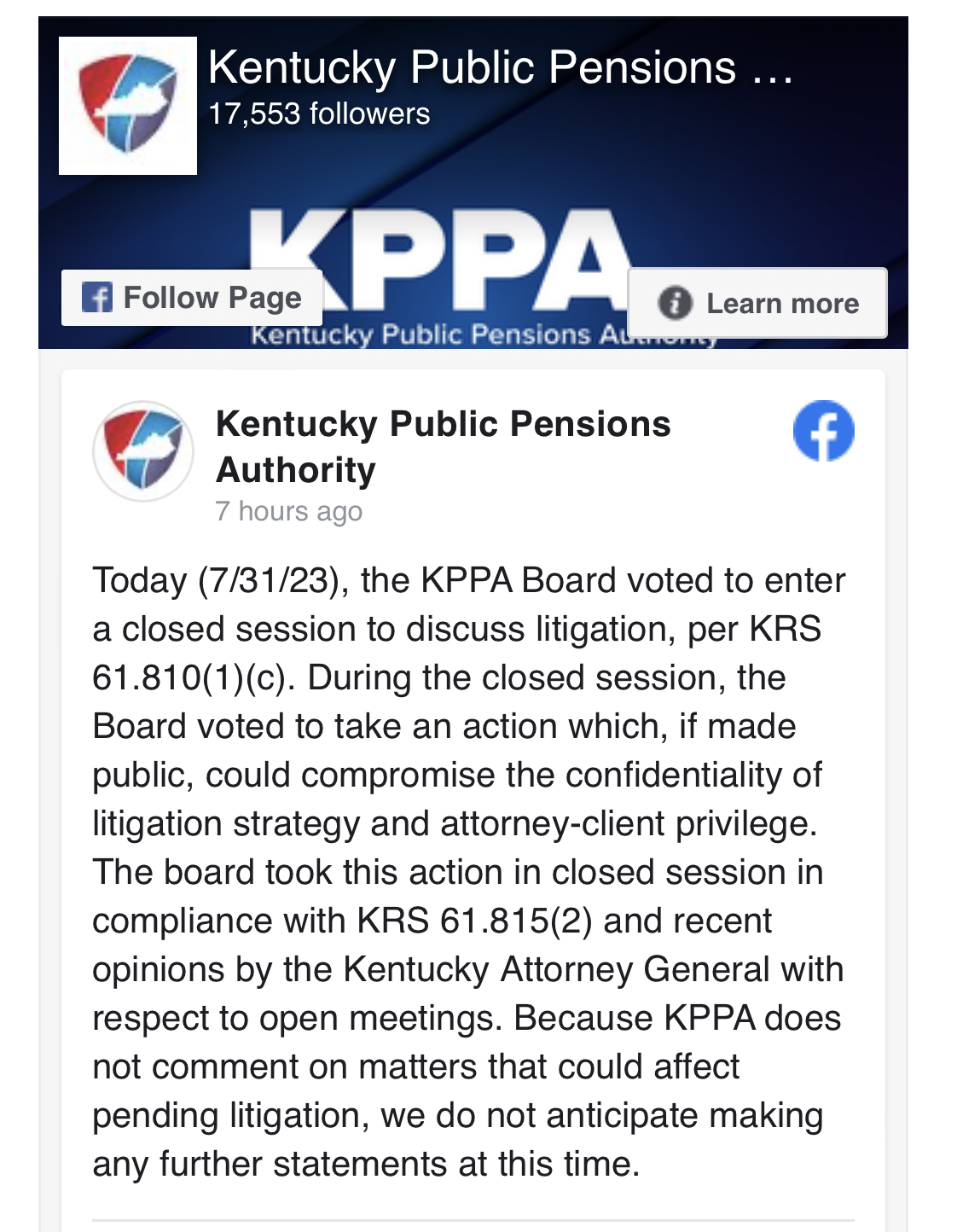
On July 31, the Kentucky Public Pension Authority issued the following statement:
“Today (7/31/23), the KPPA Board voted to enter a closed session to discuss litigation, per KRS 61.810(1)(c). During the closed session, the Board voted to take an action which, if made public, could compromise the confidentiality of litigation strategy and attorney-client privilege. The board took this action in closed session in compliance with KRS 61.815(2) and recent opinions by the Kentucky Attorney General with respect to open meetings. Because KPPA does not comment on matters that could affect pending litigation, we do not anticipate making any further statements at this time.”
I described KPPA's response to a colleague — who had requested the clarification from KPPA — as an "artful hedge."
As is evident in KPPA’s “clarification, what was once a clear path to vindicating the public’s right to know how members of a public agency vote on final agency action has been obstructed by an open meetings decision issued by Attorney General Daniel Cameron.
Although an Oldham Circuit Court judge rejected that Attorney General’s decision — which radically departed from four decades of caselaw and Attorneys General open meetings decisions, agencies will increasingly rely on Cameron's flawed legal analysis to justify absolute closed session secrecy — some in entering closed, some in closed session discussion and final action, some in exiting closed session, and some in all three.
In the meantime, the public will be left to wonder how the agency’s public policy was formed, how agency members voted — and in some instance, what that public policy is!
The Kentucky Open Government Coalition examined Daniel Cameron's open meetings decision -- and the Oldham County Circuit Court opinion rejecting it -- in the June 27 Kentucky Lantern.
https://kentuckylantern.com/2023/06/27/a-judge-rejects-camerons-disrega…
https://kyopengov.org/blog/precedent-over-policy-preference-how-oldham-…
We reported that Judge Jerry Crosby II reversed a September, 2022, open meetings decision that would have effectively “eviscerate[d] most of the Open Meetings Act’s operative provisions.” In so doing, Judge Crosby voided the action illegally taken by the Oldham County Ethics Commission in closed session. He focused on Cameron’s unexplained departure from an interpretation of a law that “goes back forty plus years with no overt repudiation by the Courts or the legislature as to a different interpretation.”
https://drive.google.com/file/d/1kHzUyuhEjoAerC5EY6FCpcxcVb_ic9ub/view
https://www.ag.ky.gov/Resources/orom/2022/22-OMD-187.pdf
In the September 22 open meetings decision, Cameron had determined that a public agency may ignore the conditions for conducting a closed session -- including the requirement that it provide "specific and complete notification in the open meeting of any and all topics which are to be discussed during the closed meeting," discuss only those matter identified in open session, and take final action only in open session -- without violating the open meetings law.
https://apps.legislature.ky.gov/law/statutes/statute.aspx?id=23045
https://caselaw.findlaw.com/court/ky-supreme-court/1012466.html
Taking it’s cue from Cameron’s now discredited open meetings decision, and unidentified "outside counsel,” on July 31 KPPA acknowledged that it took final action in closed session.
And so we find ourselves in a chaotic place where some public agencies rely on judicially repudiated legal guidance -- per KPPA, "recent opinions by the Kentucky Attorney General with respect to open meetings" -- from an Attorney General "who overturn[ed] decades of decisions by both the Attorney General and the Kentucky Courts" and, "most troubling, . . . offer[ed] no rationale for this departure especially in light of the fact that no changes were made by the legislature to these provisions” of the meetings laws.
We find ourselves in a place where we are precluded from knowing whether a closed session is authorized, on what public business elected agency members voted in closed session, and how they voted. In the final analysis, we are denied the ability to hold the members accountable.
Just as Daniel Cameron would have it.
KPPA's July 31 closed session is likely to be an early indication of a lamentable direction espoused by the current Attorney General and disciples of the gospel of government secrecy.


